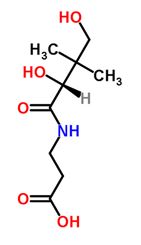Pantothenic acid, also called pantothenate or vitamin B5 (a B vitamin), is a water-soluble vitamin discovered by Roger J. Williams in 1919. For many animals, pantothenic acid is an essential nutrient. Animals require pantothenic acid to synthesize coenzyme-A (CoA), as well as to synthesize and metabolize proteins, carbohydrates, and fats. Pantothenic acid is the amide between pantoic acid and β-alanine. Small quantities of pantothenic acid are found in nearly every food, with high amounts in whole-grain cereals, legumes, eggs, meat, royal jelly, avocado, and yogurt. It is commonly found as its alcohol analog, the provitamin panthenol, and as calcium pantothenate. Pantothenic acid is an ingredient in some hair and skin care products. Only the dextrorotatory (D) isomer of pantothenic acid possesses biologic activity. The levorotatory (L) form may antagonize the effects of the dextrorotatory isomer
(pantothenic acid; pantothenate; D-pantothenic acid; Chick antidermatitis factor; (R)-pantothenate)
